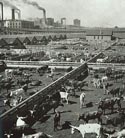To Conclude
Way back at the beginning of this conversation in August, I posted about the book jacket blurb and author introduction in my copy of the book. One of the main points was Sinclair’s disappointment with the response to his book. It raised a public outcry and lead to more legislation than probably any other book has, but that effect missed the target. After its exposure in The Jungle, people got fired up about the meatpacking industry and cried out for reform, which led to the first regulation of the industry and led to much safer meat handling and procedures. The book brought about real change. But Sinclair’s target was capitalism itself, and the particular industry was used just as an example of capitalism’s evils. Which is what I definitely got from reading the book. If you really look at it, the gross treatment of food plays a fairly minor role in the book. Much more omnipresent, I felt, was the overall system of graft and corruption. From Jurgis’s perspective, I got more fired up about that than his more isolated experience with Packingtown.
So why didn’t the general public? It goes back to what I wrote in that earlier post. People are generally self-centered beings. Most people didn’t live in Chicago, fewer were poor Chicagoans, and even fewer were workers in Packingtown. The general public didn’t really care about corruption in Chicago or even improving the plight of the meatpacking labor force. No, all they saw was what affected them directly: the food they had to eat. They wanted the industry cleaned up so they could trust the food coming out of it, and nothing else. They cared only about themselves.
The book didn’t miss its mark, Sinclair just overestimated the inherent goodness of people and their energy for caring. I’m sure everyone felt bad for Jurgis, but translating that emotion into action was more than most people could muster (regardless of his point that it would help them, too).
(Cynicism lesson over.)
So why didn’t the general public? It goes back to what I wrote in that earlier post. People are generally self-centered beings. Most people didn’t live in Chicago, fewer were poor Chicagoans, and even fewer were workers in Packingtown. The general public didn’t really care about corruption in Chicago or even improving the plight of the meatpacking labor force. No, all they saw was what affected them directly: the food they had to eat. They wanted the industry cleaned up so they could trust the food coming out of it, and nothing else. They cared only about themselves.
The book didn’t miss its mark, Sinclair just overestimated the inherent goodness of people and their energy for caring. I’m sure everyone felt bad for Jurgis, but translating that emotion into action was more than most people could muster (regardless of his point that it would help them, too).
(Cynicism lesson over.)

